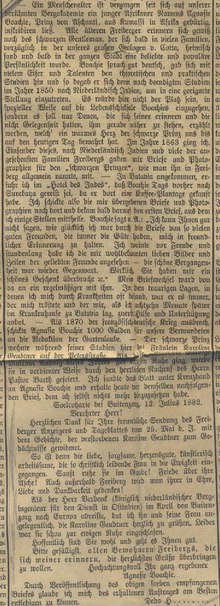Kwasi Boachi
Prince Agnasie Boachi of Ashanti (Kwasi Boachi) (April 24, 1827 - June 9, 1904) was the eldest son and prince of the Ashanti Empire, who was heir to the throne by his father King Kwaku Dua I. Panyin in 1837 together with his cousin Kwame Poku , in connection with negotiations between the Ashanti and the Dutch about the recruitment of Ashanti soldiers for the Dutch East Indies to the Netherlands.
Major General Verveer had signed an agreement with the king on behalf of the Dutch government in 1837, according to which he would deliver several thousand soldiers to the Dutch East Indies every year.

Kwasi Boachi left Kumasi with a Dutch expedition on March 18, 1837 , he was about 10 years old. The two were welcomed warmly, were also often guests at King Wilhelm II , Kwasi made friends with Hermann Bernhard Georg von Sachsen-Weimar-Eisenach and remained in regular correspondence with the later Württemberg general until his death in 1901.
They received an excellent education, learned English, French and German. They were baptized in 1843 and are members of the Dutch Reformed Church .
In August 1843, Kwasi Boachi was accepted into the Delft Royal Academy for training as a mining engineer . He graduated in 1847.
His cousin Kwame Poku returned to the Dutch Gold Coast as planned in 1847 , entered the Dutch service as a corporal, but was refused the promised officer rank. His suicide in 1850 reinforced Kwasi Boachi's endeavors "to free himself from Dutch paternalism".

With the support of the Dutch king (200 guilders per month) he was given the opportunity to continue his studies at the Bergakademie Freiberg in Saxony with Bernhard von Cotta . He was enrolled on September 1, 1847 with the matriculation number 1637.
During his studies at the Bergakademie Freiberg he lived with Christiana Carolina Geudtner on Petersstrasse. or on the corner of Rinnengasse and Petersstrasse.
He kept fond memories of the time in Freiberg with numerous personal encounters, and donated 1,000 guilders to Freiberg for the wounded during the Franco-German War in 1870.
In response to the news of the death of his landlady at the time in 1882, he wrote back a worthy letter of condolence (see Freiberger Anzeiger 25 Aug 1882).
After completing his studies in Freiberg, he returned to the Netherlands and was sent to the Dutch East Indies in 1850 under the direction of C. de Groot van Embden . Apparently the latter had the idea that Boachi should never be at the head of the corps of mining engineers, that no European engineer should be allowed to serve under him.
There he was repeatedly discriminated against by his superior, Cornelius de Groot van Embden, so he was not promoted to chief engineer "because of the color of his skin," contrary to his promises. (quoted by Arnold)
After his complaints, he received financial compensation in the form of an allowance of 500 guilders from 1857, increased to 600 guilders per month from 1894, and an estate in Bantar Peteh, south of Bogor .
He died there in 1904.
Web links
Individual evidence
- ↑ Twee-ashanto-prinsen
- ^ A b c d e f Anne-Sophie Arnold: Foreign home, native foreigners: Kwasi Boakye in Germany. In: Foreign experiences. Asians and Africans in Germany, Austria and Switzerland until 1945. ed. Gerhard Höpp. Das Arabische Buch , Berlin 1996, ISBN 3-86093-111-3 , pp. 259-274.
- ↑ a b c Nieuw Nederlandsch biographical woordenboek. Deel 7
- ↑ C. Schiffner : From the life of old Freiberg mountain students. Freiberg, 1935, p. 327.
- ^ Letter from P. Grinwis Plaat to Bergamtsrat Wappler, April 23, 1907, Freiberg City Archives, AB 83
| personal data | |
|---|---|
| SURNAME | Boachi, kwasi |
| ALTERNATIVE NAMES | Boachi, agnasia |
| BRIEF DESCRIPTION | Prince of the Kingdom of Ashanti |
| DATE OF BIRTH | April 24, 1827 |
| DATE OF DEATH | June 9, 1904 |



